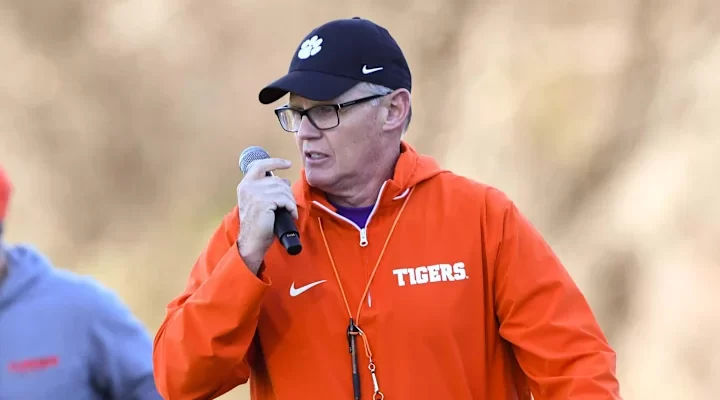How Clemson Football Assistants Compare Tom Allen, New Defensive Coordinator, to Wes Goodwin: A Tale of Leadership and Defensive Mastery
In the ever-evolving landscape of college football, coaching hires can make or break a team’s trajectory. When the Clemson Tigers announced Tom Allen as their new defensive coordinator, the news was met with intrigue and excitement. But what truly amplified the buzz was the way Clemson football assistants quickly began likening Allen to one of their own defensive masterminds, Wes Goodwin. This comparison, coming from those who know the program intimately, speaks volumes about Allen’s coaching philosophy, leadership style, and his potential to leave a profound impact on Clemson’s defense. Understanding this parallel offers a window into the expectations and hopes surrounding Allen’s tenure and what it means for Clemson football’s future.
Wes Goodwin, a Clemson alumnus and longtime assistant, has long been regarded as a cornerstone of the Tigers’ defensive success. Known for his meticulous attention to detail, ability to connect with players, and innovative scheming, Goodwin’s influence on the program has been profound. He embodies a blend of old-school grit and modern football savvy, a combination that has helped Clemson maintain its status as a defensive powerhouse. When assistants draw parallels between Tom Allen and Goodwin, they are effectively positioning Allen as a continuation—or even an evolution—of that legacy.
Tom Allen’s coaching résumé is impressive, marked by steady ascension through the ranks and a reputation for transforming defenses. His work at Indiana, where he served as head coach, showcased his defensive acumen and ability to galvanize units that often faced talent disparities. Allen’s defenses were known for their aggressiveness, discipline, and adaptability—traits that Clemson values deeply. The assistants see in Allen a kindred spirit who emphasizes preparation, accountability, and a player-first approach. These qualities are essential in a program that demands excellence both on the field and in developing young men.
One of the most frequently cited similarities between Allen and Goodwin is their leadership style. Both coaches foster environments of trust, open communication, and high expectations. Players under their guidance feel challenged but supported, empowered to take ownership of their roles. This balance between discipline and encouragement is crucial for maintaining a motivated and cohesive defensive unit. Clemson’s assistants note that Allen’s ability to build relationships and communicate complex concepts in relatable ways mirrors Goodwin’s approach, suggesting that players will respond well to his methods.
Strategically, Allen and Goodwin share an emphasis on versatility and creativity. Clemson’s defense under Goodwin has been known for its ability to adjust mid-game, shifting coverages and blitz packages to keep offenses off balance. Allen’s track record indicates a similar penchant for flexible schemes that leverage player strengths and exploit opponent weaknesses. This strategic alignment means that Allen can seamlessly integrate into Clemson’s defensive culture while also bringing fresh ideas to elevate the unit. Assistants are particularly excited about Allen’s innovative blitz designs and his emphasis on aggressive but disciplined play, which they believe will enhance Clemson’s defensive identity.
Another point of comparison lies in their commitment to player development. Both Allen and Goodwin prioritize the growth of each individual on the roster, focusing not just on physical skills but also on mental toughness and football IQ. Clemson assistants have observed that Allen invests heavily in film study and personalized coaching, helping players understand their assignments and the broader defensive scheme at a deeper level. This holistic approach to development has produced standout performers and contributed to Clemson’s reputation for developing NFL-ready talent. By likening Allen to Goodwin, the staff signals confidence that this tradition will continue under Allen’s leadership.
The cultural fit is also a significant factor in this comparison. Clemson football is more than just a program; it’s a brotherhood grounded in shared values of integrity, hard work, and resilience. Wes Goodwin embodies these values, and assistants feel that Tom Allen’s character aligns closely with the Clemson ethos. His reputation as a coach who leads by example and prioritizes building character off the field resonates deeply. This cultural alignment is critical for sustaining the program’s success and ensuring that new leadership integrates smoothly without disrupting the team’s chemistry.
Clemson’s defensive staff has also praised Allen’s ability to handle pressure and adversity, a trait they see reflected in Goodwin’s tenure. Coaching at a program with national championship aspirations demands resilience and the capacity to adapt to the intense scrutiny and high expectations that come with the job. Allen’s experience navigating challenging seasons and turning programs around demonstrates his readiness for this environment. Assistants believe that his calm demeanor and steady leadership will stabilize the defense during high-pressure situations and inspire confidence throughout the roster.
While the comparison to Wes Goodwin is flattering and sets high expectations, Clemson assistants acknowledge that Tom Allen brings his own unique flavor to the role. His background as a head coach gives him a broader perspective on managing a football team, which could enhance his decision-making and strategic planning as a coordinator. This experience complements Goodwin’s strengths and suggests a partnership that blends continuity with innovation. The coaching staff anticipates that Allen’s arrival will inject fresh energy and new perspectives into the defense, potentially unlocking new levels of performance.
Recruiting is another area where Allen’s presence is expected to have a positive impact. Clemson has consistently attracted top-tier defensive talent, thanks in part to the program’s reputation and the credibility of its coaching staff. Allen’s track record and name recognition could bolster recruiting efforts, particularly among defensive prospects who respect his coaching style and success. The assistants believe that Allen’s emphasis on developing players for the next level will be a strong selling point, reinforcing Clemson’s position as a destination for ambitious defensive athletes.
As preseason preparations get underway, the buzz surrounding Tom Allen’s hiring continues to grow. Clemson’s assistants are enthusiastic about the synergy between Allen’s coaching philosophy and the program’s defensive identity. The parallels to Wes Goodwin provide a comforting sense of continuity, while Allen’s distinct qualities promise to push the defense forward. Players have reportedly responded positively to Allen’s arrival, noting his approachable demeanor and clear vision for the unit. This early buy-in bodes well for a smooth transition and a united effort to reclaim defensive dominance.
The Clemson community—fans, alumni, and analysts—will be watching closely as Allen steps into this pivotal role. The comparisons to Goodwin set a high bar, but they also underscore the trust and optimism the staff has in Allen’s ability to lead. His success will depend not only on tactical execution but also on sustaining the culture and values that have defined Clemson football’s defensive excellence. If Allen can meld his strengths with those of the existing staff, the Tigers could enjoy a resurgence on defense that propels them deep into postseason contention.
In summary, the Clemson football assistants’ likening of Tom Allen to Wes Goodwin reflects more than just coaching style; it embodies shared leadership principles, strategic vision, and a commitment to player development that define Clemson’s defensive legacy. Allen’s arrival marks both a continuation of that legacy and a new chapter filled with promise. As the Tigers prepare for the upcoming season, this comparison sets the stage for a defense poised to reclaim its status among college football’s elite, driven by a coordinator who carries the spirit and savvy of one of Clemson’s finest.


